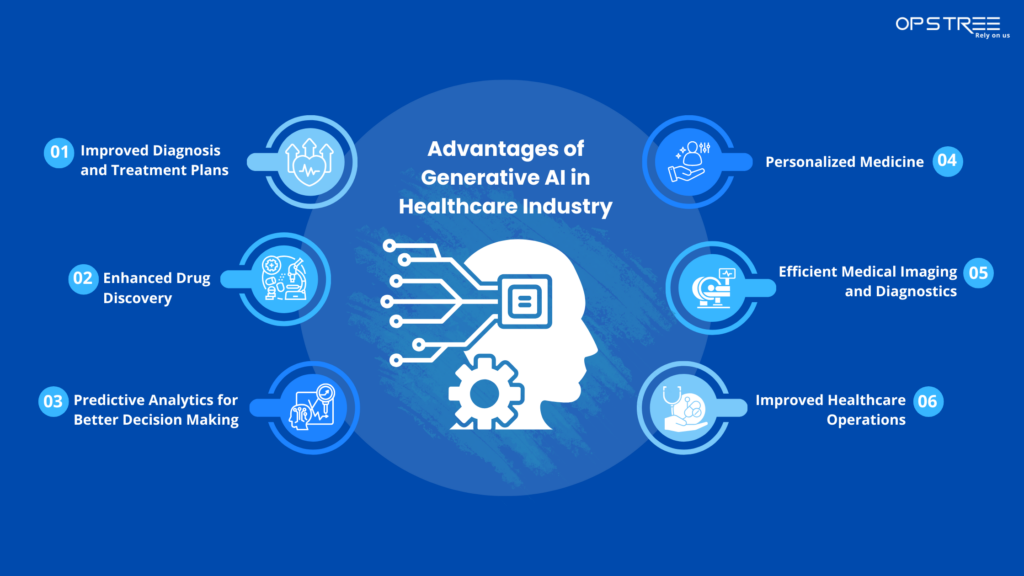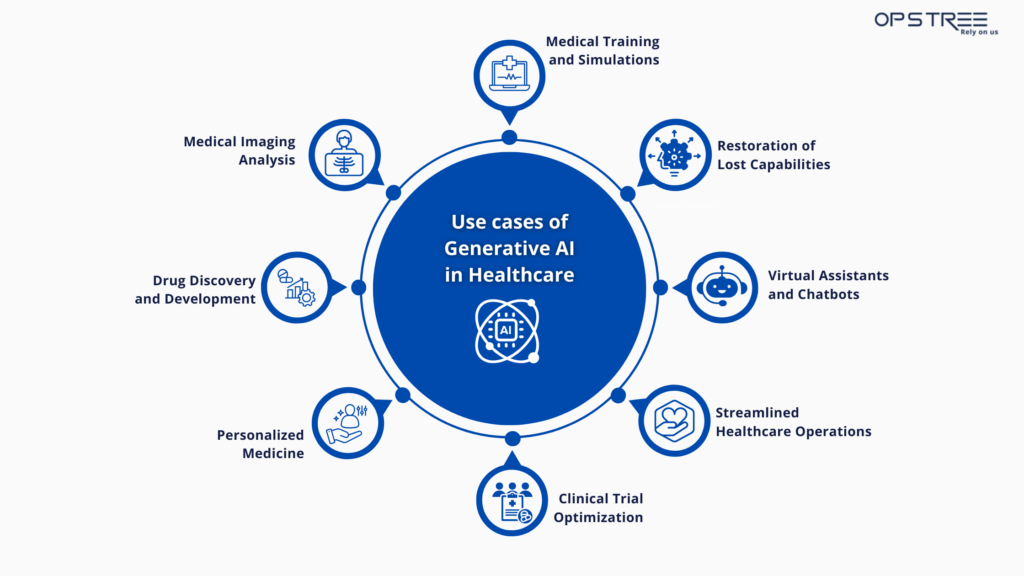The role of AI in healthcare involves the application of machine learning, natural language processing, deep learning, and other advanced technologies to enhance the experiences of both healthcare professionals and patients.
By leveraging AI’s data-processing and predictive capabilities, healthcare providers can better manage resources and adopt a more proactive approach to care.
These technologies empower doctors to make faster and more accurate diagnoses, allow health administrators to access electronic health records more efficiently, and enable patients to receive timely, personalized treatments.
Now, I’m sure we all understand what AI is in healthcare. Bear with us, as we are about to take off, and you’ll learn all about AI in healthcare. Let’s get started!
Benefits of Generative AI in Healthcare Industry
Generative AI is transforming the healthcare industry by offering innovative solutions to improve patient care, streamline operations, and support medical advancements. Here are some key benefits of Generative AI in healthcare:

- Improved Diagnosis and Treatment Plans
Generative AI can assist in creating more accurate and personalized treatment plans by analyzing patient data, medical history, and genetic information. It can generate predictions on disease progression and suggest the best course of treatment.
- Enhanced Drug Discovery
AI algorithms can generate new molecular structures and predict drug effectiveness, speeding up the drug discovery process.
- Predictive Analytics for Better Decision Making
Generative AI can analyze large volumes of healthcare data, identifying trends and patterns that may not be immediately apparent to human clinicians.
- Personalized Medicine
By analyzing genetic data, lifestyle factors, and other personal health information, generative AI can design personalized treatment plans tailored to each patient’s specific needs.
- Efficient Medical Imaging and Diagnostics
AI can generate and improve medical imaging data, making it easier to identify abnormalities like tumors, fractures, or infections.
- Improved Healthcare Operations
Generative AI helps streamline administrative processes such as appointment scheduling, patient intake, and claims processing.
Applications of Generative AI in Healthcare
Generative AI, powered by advanced algorithms and data analysis, has the potential to tackle key challenges in numerous fields. Here are some notable use cases where it can drive meaningful impact:

- Medical Imaging Analysis
Generative AI is becoming a valuable tool for radiologists, helping them swiftly and accurately detect and diagnose diseases from X-rays, MRIs, and CT scans. By training on a broad range of patient data, these models can identify early indicators of conditions like skin and lung cancers, Alzheimer’s disease, and diabetic retinopathy.
They also detect biomarkers tied to specific disorders and predict disease progression. This speeds up diagnoses and improves precision, enabling earlier detection and better patient outcomes.
For instance, the PANDA system, developed by 35 researchers, leverages AI in CT screening to achieve higher accuracy than human radiologists in identifying pancreatic cancer.
It has a 92.9% accuracy rate for cancer-positive cases and a 99.9% accuracy rate for non-cancer cases. This offers a cost-effective method for analyzing large groups of asymptomatic patients.
- Drug Discovery and Development
Generative AI is revolutionizing pharmaceutical research by accelerating drug discovery and development. AI models analyze molecular structures and biological data to generate chemical compounds with desired properties, such as efficacy and safety profiles.
This technology can sift through vast datasets quickly, identifying promising candidates for clinical trials, optimizing molecular structures, and predicting potential side effects.
While the drug development process typically takes 12-15 years and costs billions, generative AI has shortened the pre-clinical phase for pulmonary fibrosis drugs to just 30 months.
- Personalized Medicine
Generative AI integrates vast amounts of patient data, such as electronic health records, genomic information, and clinical notes, to create tailored treatment plans.
By analyzing these diverse datasets, AI algorithms can spot patterns, predict disease progression, and recommend the most effective treatment strategies based on an individual’s medical history.
This personalized approach maximizes treatment effectiveness and minimizes adverse effects, resulting in improved patient outcomes.
Additionally, AI processes data from wearable devices, detecting trends and anomalies in vital health indicators like heart rate variability and blood glucose levels, enabling early intervention and tailored treatment.
- Clinical Trial Optimization
Generative AI can optimize health insurance processes, including prior authorization and claims management, which are often costly and time-consuming for private payers. AI can convert unstructured data into structured formats, enabling near-instant benefits verification.
By accurately calculating out-of-pocket costs and factoring in healthcare providers’ contracted rates, patients’ benefits, and other variables, AI significantly accelerates processes that traditionally took an average of ten days.
- Streamlined Healthcare Operations
Generative AI can also streamline administrative tasks in healthcare settings, significantly reducing the workload of providers.
According to Accenture, AI can potentially enhance 40% of healthcare providers’ work hours. It improves operational efficiency by transcribing patient consultations, summarizing clinical notes, filling EHR fields, and generating clinical documentation.
It also optimizes appointment scheduling and creates personalized reminders, follow-up emails, and predictive analyses of medical insurance claims.
A study by Mayo Clinic Proceedings revealed that surgeons using a large language model (LLM) could generate high-quality clinical notes in seconds, compared to the seven minutes typically required. This increased efficiency by 84 times and yielded satisfactory patient and physician results.
Did You Know?
McKinsey reports that incorporating AI into big data strategies within the US healthcare system could unravel an annual value of up to $100 billion. This includes the use of predictive modeling and comprehensive sensor data analysis.
- Virtual Assistants and Chatbots
AI-powered virtual health assistants provide patients with easy access to healthcare services through conversational interactions. Integrated with electronic health record systems, these chatbots help patients manage appointments, reschedule, or join waitlists without human intervention.
They also send personalized medication reminders and adherence alerts, ensuring patients stay on track with their treatments.
For example, if a patient with arthritis seeks approval to start a new physical activity, an AI chatbot can provide guidance, considering their medical history, while filtering out conflicting advice.
- Restoration of Lost Capabilities
AI offers groundbreaking solutions for restoring lost abilities, such as speech or movement, by interpreting signals from the brain or nerves. This advancement is transforming neurotechnology and rehabilitation in healthcare.
Researchers in bioelectronic medicine are implanting microchips into the brains of individuals with tetraplegia to reconnect the brain with the spine, enabling them to regain movement in their hands and experience sensation once more.
Additionally, the GrapheneX-UTS team has developed technology that decodes the silent thoughts of paralyzed individuals into text, helping them communicate again. This technology has potential applications in human-machine communication, such as controlling bionic limbs.
8. Medical Training and Simulations
Generative AI enhances medical training by providing lifelike simulations of various health scenarios, offering medical professionals and students a risk-free environment to practice and learn. These AI-powered simulations are often integrated with virtual and augmented reality (VR/AR) headsets to enhance the realism further.
For instance, Western Michigan University has incorporated over 100 hours of simulation training into its medical curriculum, allowing students to engage with realistic patient scenarios. After each simulation, students receive feedback from professors at the university’s Simulation Center, further improving their clinical skills.
Companies Using AI in Healthcare
These companies are leading the charge in healthcare innovation through the power of AI technology.

- PathAI
PathAI, a biotechnology company, leverages Generative AI to transform pathology services by automating and improving diagnostic accuracy. Their platform assists pathologists in detecting and diagnosing diseases from digital pathology images, resulting in more accurate and efficient diagnoses.
- Zebra Medical Vision
Zebra Medical Vision employs Generative AI to analyze medical imaging data, including X-rays, CT scans, and MRIs, helping radiologists detect and diagnose a variety of diseases. Their algorithms identify abnormalities in imaging studies and prioritize cases that require urgent attention, improving the efficiency of radiology workflows.
- NVIDIA
NVIDIA has launched Generative AI microservices designed to enhance drug discovery, MedTech, and digital health. Available through the NVIDIA AI Enterprise 5.0 platform, these microservices offer various capabilities, including advanced imaging, natural language processing, and digital biology generation.
- Pfizer
Pfizer, a global leader in the pharmaceutical industry, leverages its “Charlie” platform to revolutionize pharmaceutical marketing by streamlining content creation and legal review processes.
Charlie uses Generative AI to enhance digital media, emails, and medical articles, enabling personalized content and providing valuable insights into customer behavior. Pfizer’s collaboration with Publicis Groupe ensures robust data privacy and efficient medical and legal reviews.
OpsTree and AI in Healthcare
At OpsTree, we are integrating AI in healthcare to improve every aspect of patient care. Our AI-driven solutions help healthcare professionals analyze patient data faster, predict health outcomes, and automate key processes.
By enhancing diagnostic accuracy and improving workflow efficiency, OpsTree is setting new standards in healthcare, enabling providers to deliver better, more personalized care while optimizing costs and resources.
Frequently Asked Questions
- How is AI improving diagnosis in healthcare?A. AI improves diagnosis by analyzing large medical records and imaging datasets to detect patterns and abnormalities, providing faster and more accurate results for conditions like cancer, Alzheimer’s, and more.
- What role does Generative AI play in drug discovery?A. Generative AI accelerates drug discovery by generating new molecular structures, predicting their efficacy, and optimizing the drug development process, significantly reducing time and costs.
- How does AI support personalized medicine?A. AI uses patient data, such as genetic information, medical history, and lifestyle factors, to create tailored treatment plans, improving effectiveness and reducing side effects.
- Can AI optimize healthcare operations?A. Yes, AI streamlines tasks like scheduling, claims processing, and documentation, enabling healthcare providers to focus more on patient care and less on administrative duties.
- How are AI-powered virtual assistants used in healthcare?A. Virtual assistants help patients manage appointments, provide medication reminders, and offer health advice, ensuring better adherence to treatments and improved patient engagement.
- How is OpsTree contributing to AI in healthcare?
A. OpsTree integrates AI-driven solutions to enhance diagnostic accuracy, streamline workflows, and predict patient outcomes, enabling healthcare providers to deliver personalized care efficiently while optimizing resources.
